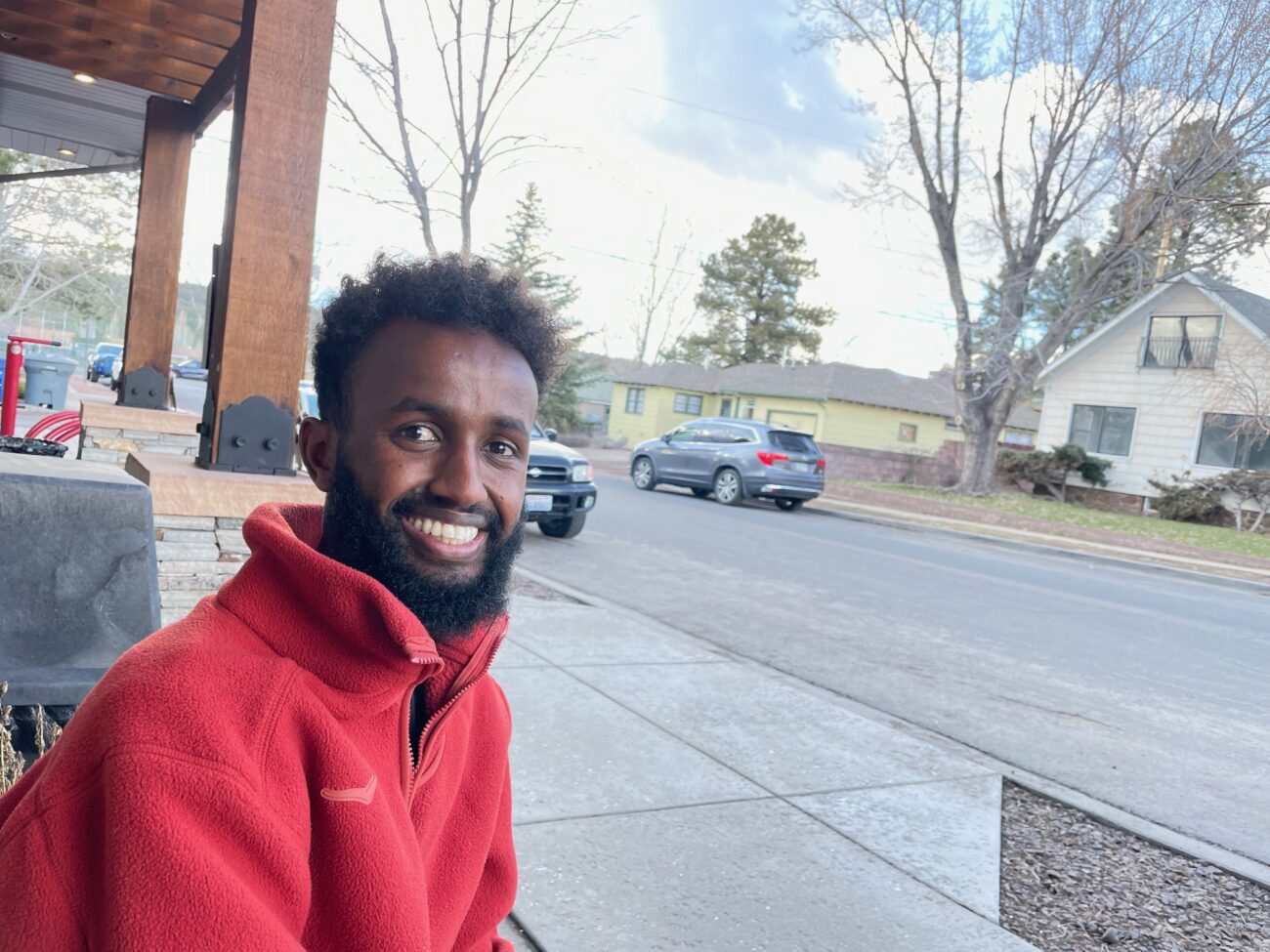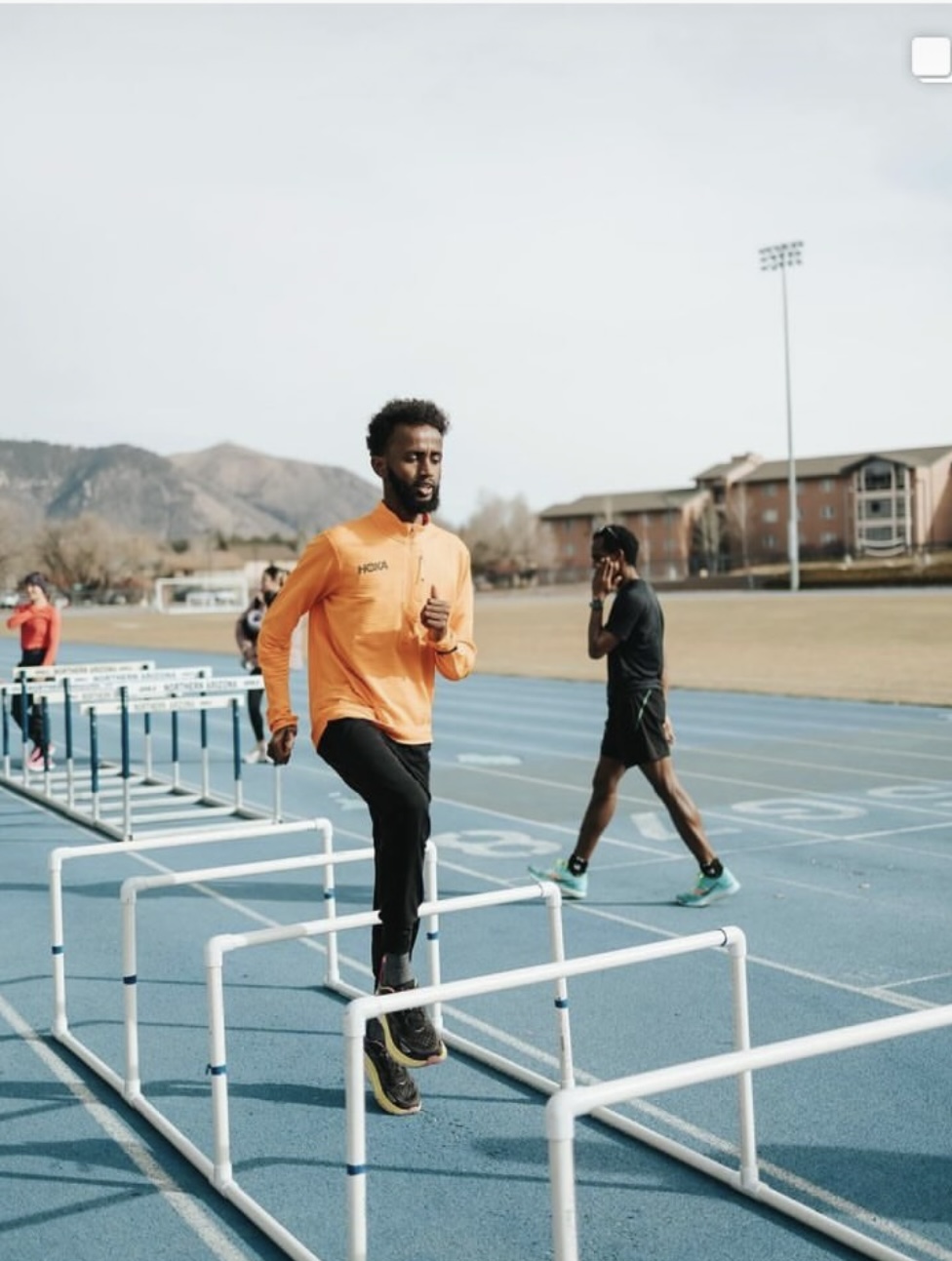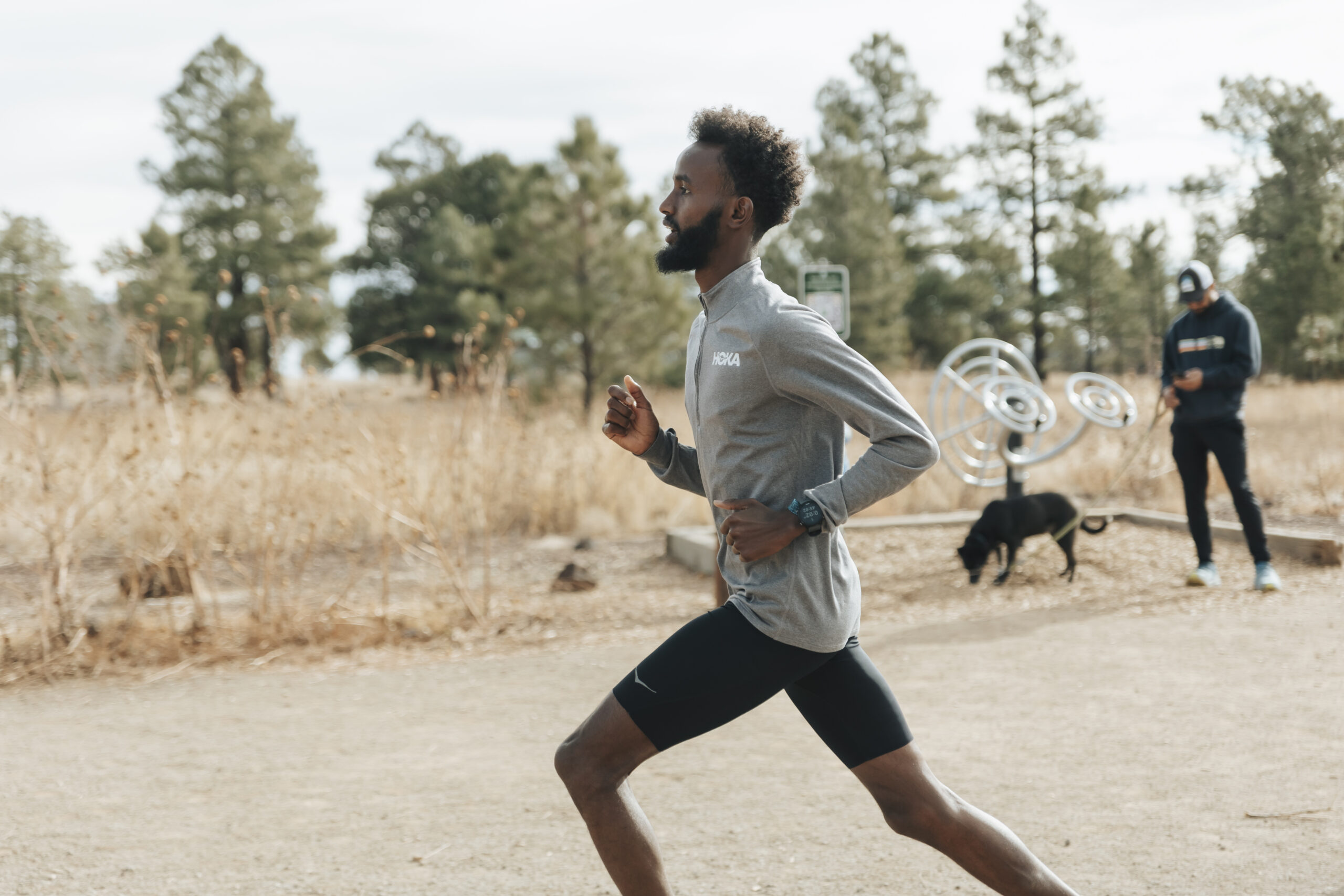An elite runner, a former refugee, a global citizen, Muhumed cares about his times and world inequality
For a man who possesses that typical lithesome frame of an elite distance runner, whose upper body all but disappears under an enveloping red fleece pullover, who walks the Flagstaff streets in relative anonymity, NAZ Elite’s Ahmed Muhumed, in the words of Walt Whitman, contains multitudes.
“There are a lot of identities I carry as a guy sitting here in front of you,” Muhumed said one recent afternoon at the Kickstand Kafe. “I’m a professional runner, a brother, a son, a former refugee but an American citizen. I’m a friend, a Muslim, a Black man. Those are titles we give each other in society, or we give ourselves. But the one thing I really identify with is the idea of being a global citizen.”
There is, indeed, many facets to Muhumed, 27, who will represent the United States on March 30 in the World Athletics Cross Country Championships in Belgrade.
He is an elite 5,000 meter runner, a teammate, a fiancé to be married in May, a former refugee from the Somali region of Ethiopia who came to Portland at age 13 as part of a United Nations emigration program, a scholar who holds a masters degree in International Relations, an advocate for human rights who is outspoken about the treatment of Palestinians in Gaza, and a man who cares deeply about the world and recoils at the horrors he sees playing out globally.
The role of world-class athlete, of course, is not mutually exclusive from having a well-rounded life – though, in an Olympic year, many a runner can be excused for being singleminded. And Muhumed is nothing if not dedicated to his athletic pursuits as he embarks on World Cross and then his outdoor season and the U.S. 5K trials in June.
After all, he is so devoted to running that he turned pro after getting his graduate degree at Florida State without sponsorship. At times, he worked two jobs, woke up before dawn to run at 5 a.m. before making an hour commute to his job at a nonprofit only to run again in the evening, paid his own way to meets, scoured the internet for discount shoes. And later, after moving from Portland to Flagstaff, tapping into his savings, he crashed at Dark Sky Distance’s Kasey Knevelbaard’s house, begged rides to workouts from Abdi Nur because he had no car, hung out with Woody Kincaid to get some quality sessions in – all with the hope of being where he is now, sponsored by Hoka and representing the U.S. in international competition.
So, yeah, no one questions Muhumed’s commitment to the sport.
But there are other sides to his personality and life, all equally compelling.
Ahmed The Pro Runner
With his career now scaling to a zenith, Muhumed has not forgotten the nadir, which had to be last May’s USATF Los Angeles Grand Prix 5,000 meters. Only 20 days prior, Muhumed had run a 13:06 personal best, and his hopes were buoyed that he might interest a pro team, but at the Grand Prix he finished 16th in 13:31.60.
He was devastated. He was going backward, the stress of working and living in flux in Portland with two jobs and no corporate shoe support was weighing heavily on him.
“My body just got burnt out in that Grand Prix,” he recalled. “I mean, I only ran a couple seconds faster than a high school guy (Lex Young, Nico’s brother). I was down, but I tried to stay positive in the cooldown with Kasey. I went back to the hotel that night – I paid for all my travel, everything out of my pocket – and I was thinking. I realized I spent $1,200 on that trip alone, and I didn’t even showcase. That Sunday morning, when I got back to Portland, I booked a flight to Flagstaff.”
He was ready to go all in for one last shot. But not before he talked with his mother.
“As a refugee, my parents invested all their money, time and livelihoods to our success,” said Muhumed, the second oldest of nine children. “It’s in the back of our heads that you tend to feel obligated to give back to the family. So, me quitting my job, it doesn’t look good. But I have such great parents. My mom told me, ‘If it’s something that makes you happy, why don’t you do it?’ I remember going downstairs that same day and booking my flight to Flag and quitting my job. I remember the date: June 3.”

Though he was taking a big chance, and living an untethered existence with a murky future, Muhumed benefited from the move to Flagstaff and working out with Nur and Kincaid. Five weeks later, at the U.S. Championships in Eugene, Ore., Muhumed bounced back to finish eighth in the 5K, an encouraging result that gave him hope for faster, and better, times ahead.
“I may not have been ideally set up like a lot of guys in that race, but I was here to say I belong,” he recalled. “Sometimes, in my mind, I still had that imposter syndrome, like, ‘Can I really compete, do I belong here?’ I dropped a 54 (second lap) from 600 to 200 meters – then I died. OK, that’s a tactical error, but I was proud I made that decision. It said to me, I’m not afraid to get passed in the home stretch. It said to me, I’m willing to take a risk.”
NAZ Elite, apparently, was also impressed. That same day, Muhumed got a text from NAZ Elite assistant coach Jenna Wrieden. It was what he’d long awaited. It wasn’t the first time Muhumed had heard from NAZ Elite. The group flew out Muhumed for a visit more than a year earlier, in April of 2022, but no offer was forthcoming them.
There was, this time.
His doggedness paid off with a contract.
“A lot of people would’ve walked away,” Muhumed said of his persistence. “I’ve had two or three thoughts where it was like, is this realistic? Every race I came into was with the idea that this could be my last race. It made me grateful (to get a contract). I could stay in Flagstaff, be part of a team and not have to pay for flights and hotels. I could care less at that point what I’d get paid.”
What Muhumed gained during that year spent running unattached was a greater appreciation for the life of a U.S.-based pro runner.
“I was in Ethiopia that January and February (2023),” he said. “I was getting paid for working (remotely) 20 hours a week (for his nonprofit job), really decent pay, and every two weeks, I’d get the direct deposit. I am running there with a bunch of Somali athletes who are mostly from different regions in the world, mostly East Africa, and some of these guys are running in the same pair of shoes for a year, two years. A pair of shoes was $130. Their income was $120 a month. I thought I had it rough by paying for my own shoes, but I see those guys and I think, man I’m blessed. One, I’m from the U.S. where there’s opportunities for racing, and, two, I have an agent (Ray Flynn) who was still looking for teams for me, and three, I still had a job that could cover (expenses). And four, I had that passport where I could go anywhere in the world to train.

“It’s perspective-based. Then I come back to Flagstaff. The month of June, I was looking for shoes on discount. I didn’t know how much longer I could go. To me, it was the last straw. I thought, this has to pay off, sooner rather than later. And it did. I am blessed.
“My grandmother used to say, ‘Doors of opportunity will open for you. Every little step of my life, it felt like each was a door opening. It was my parents leaving everything behind and bring me to the States. The second door was my parents always getting us involved in education. Then running in middle school. Then a scholarship to run collegiately. Another scholarship as a grad student. Then, one and half years of the biggest growth I’ve made as a human being to realize my full potential within myself. Now, Hoka, this has been the biggest and best door so far.”
Ahmed The Refugee
The city of his youth in Ethiopia, Kabribayah, has been home since 1991 to one of the U.N. Refugee Agency’s largest camps for Somalis fleeing violence. Muhumed’s family did not live the camp and were relatively better off financially than most, but he grew up seeing poverty around him.
Muhumed also grew up with friends all around him, playing soccer, running around. In 2005, the U.N. started a program to resettle some Somalis in Western countries and, after a long process, the Muhumed family qualified and moved to Portland in 2011.
Ahmed was 13, a middle-schooler, bright and an excellent student. A sharp-eyed teacher at his school, Ingrid Macomber, picked up on Muhumed’s speed on the playground. In a story told often after Ahmed became a top prep runner in Oregon as a high schooler, the teacher told him that she would pay his athletics fees if he could run 4:15 for 1,500 meters. Ahmed came somewhat close, and Macomber paid the fees anyway.
Thus began a celebrated high school career in the state. The family moved to Salem, where Ahmed ended up winning state titles in cross country and track.
More impressive, at least to his family, than his times was his excellence in the classroom. A star student, Muhumed racked up enough Advanced Placement (AP) credits in high school to be a step or two ahead when he signed his scholarship to Boise State.
“Academics were really, really important in my family,” he said. “Coming from where I come from, academia was everything. I went to college at Boise wanting to eventually get into academia, do research, maybe become a professor. But I knew that would take at least a masters (degree) and I had some eligibility left, so I went into the (NCAA) portal and found Florida State.”
This was in the summer of 2021. His academic path was clear, but he was not yet ready to give up running – even though, at that time, he wasn’t running impressive times.
“I went back to Ethiopia then, first time since emigrating,” he said. “I took six friends with me, stayed in my father’s home there. All we did was eat, sleep and run. Eat. Sleep. Run. Around that time, I was like, ‘Huh, I really want to get better. I can improve if I keep running.’”
He was torn, however.
“My parents were both hard-working people who don’t need a great deal of money, but it’d be great to take the financial stress off of them. Therefore, running around without getting paid” – here he stops and shakes his head – “You know, I think culturally, sports is not that big of a thing in Somali culture. It’s family. It’s work. It’s treating people well.”
Ahmed the Global Citizen
On Instagram, Muhumed posts as much about the situation in Gaza as he does about his workouts with his NAZ Elite teammates on the track.
His activism is rare for a pro athlete these days. But Muhumed said he feels a responsibility. He called Hamas’ Oct. 7, 2023 attack that killed 1,200 Israelis “evil,” but he also highly questioned what he believes is Israel’s overwhelming response, which according to U.N. Aid Agencies and third-party journalistic reports, has resulted in more than 30,000 deaths of Palestinians, many women and children, and scores more driven from their homes to refugee camps.
“A lot of people have reached out to me to ask how I’m able to do this as a pro athlete. No one has asked me to stop. But a lot of people have shown concern for my career.”
Ahmed Muhumed
Muhumed, like many activists, wants a ceasefire. His is just one voice, of course, but he believes every voice needs to be heard. And he’s an informed voice, too, having earned a masters degree in international relations and worked for nonprofits.
“This is the field (international relations) that taught me that humans can do a lot of things, evil things,” he said. “My emphasis was political science. I learned a lot about dark history, about the things we as humans have done to each other. Colonization. Slavery. Genocide. Tribalism. Political games that do not favor the average human being. … I do not see myself as someone who’d go into world politics. That’s the one thing I do not like about my field. When you become a politician, you sell part of your soul.”
Rather, Muhumed hopes of affect change from without. He hopes one day to work for an international NGO – nongovernmental organization – to address inequality anywhere and everywhere.
“Any human being is capable of evil, the same way any human being is capable of loving each other,” he said. “My own culture, the Somali culture, it’s pretty homogenous. They have the same faith majority, same skin color majority. Language, mostly speak the same. But we still have all these conflicts, these civil wars. Why? Because humans are capable of doing bad things to each other.
“Once you know that, there comes the realization that you have to seek change in this world. And the best way to do that is to be that change. The best way to be that change is to speak my mind, based on scholarly work.”
Muhumed acknowledges that, “a lot of people have reached out to me to ask how I’m able to do this as a pro athlete. No one has asked me to stop. But a lot of people have shown concern for my career.”
He noted that whenever he posts running content on Instagram, he received a thousand views, but when he posts about Gaza, it’s more like 200. He is concerned that Meta, Instagram’s parent company, may be censoring pro-Palestinian content.
“I’m very selective in what I (post),” he said. “I never want to come off as antisemitic or Islamophobic or” — he shrugged, smiled, raised both palms – “anti-anything. It’s an issue of morality for me. Let’s for example say my career goes out the window because I stood up for what I believed in and stood up for humanity and what is right,” he added. “I just know I’m going down the right path.
“OK, what I mean is, at the end of the day, I can be the most successful professional runner that ever came out of the United States, but the legacy I want to leave is of someone who has had impact on people’s lives and is a voice for the voiceless.”


Leave a Reply